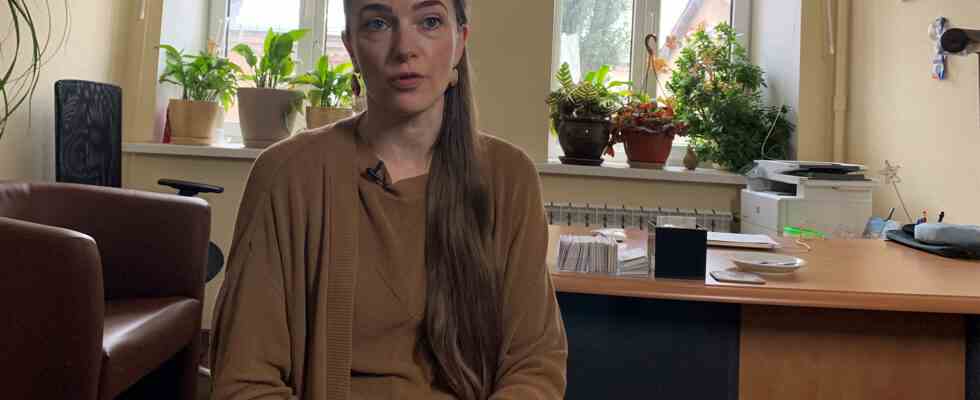portrait
Status: 07.10.2022 3:47 p.m
Oleksandra Matviychuk is Chair of the Center for Civil Liberties. The fight for human rights has moved her since childhood. In the midst of the war she sees “fantastic stories of solidarity and humanity”.
February 2022, shortly before the Russian attack: Oleksandra Matviychuk is sitting in her office in the “Centre for Civil Liberties” in Kyiv. The non-governmental organization has been campaigning for human rights since 2007 and accompanies the democratic development of Ukraine, urging, among other things, a reform of the legal system.
Matviychuk speaks calmly to the desperate caller, whose family member is being arbitrarily detained in the Russian-occupied territory in eastern Ukraine, as he says: without charge, without a lawyer, without contact with the family. For the lawyer, this is just one of umpteen cases of blatant human rights violations that she and her team have been systematically documenting since 2014 in the occupied areas around Donetsk and Luhansk in the Donbass and in Crimea, which Russia illegally annexed.
A few months later in the same office, Matviychuk is typing on her laptop. She did not leave Kyiv after the Russian invasion of Ukraine – the city where she was born, studied and lives with her husband. Your organization has now documented crimes in Bucha or Irpin. “There is life before and after February 24,” says the 38-year-old. She looks tired and has deep shadows under her blue eyes.
Oleksandra Matviychuk in Kyiv
Image: Andrea Beer
Happy about the award
She is pleased that her center received the Nobel Peace Prize together with Memorial and Ales Byalyatsky, Matviychuk wrote on Facebook after the winners were announced this year. She is currently on the train from Poland to Kyiv and apologizes to everyone who cannot reach her.
In her post, she raises political demands: The United Nations (UN) must reform itself in order to create security guarantees for all countries and their citizens. Russia should be expelled from the UN Security Council for systematic violations of the UN Charter. In addition, the United Nations must close the “accountability gap” and offer hundreds of thousands of victims of war crimes a chance at justice. Without this, sustainable peace in the region would not be possible. Matviychuk is also calling for an international tribunal to indict Russian President Vladimir Putin and Belarusian dictator Alexander Lukashenko, among others.
The Nobel Peace Prize is the second international recognition for the work of your organization: It follows the award of the donation-financed Right Livelihood Award. Matviychuk wants to receive both personally, above all so that he can draw attention to the situation in Ukraine.
“Things You Cannot Prepare For”
Around a fifth of Ukraine is currently under Russian occupation, and reports of the lawlessness that prevails in these areas are nothing short of monstrous: torture, rape, aggressive propaganda, intimidation, occupied nuclear power plants and armed coercion – such as during sham voting in Moscow-initiated “referendums” .
In the first few months, she forbade herself to reflect, says Matwijtschuk: “We saw so many crimes. If I had asked myself what I was feeling, I could have broken. But it’s becoming increasingly difficult for me to accept the feelings under control – and I don’t know how to deal with it.”
She has been working as a professional human rights lawyer protecting human rights in Ukraine for 20 years and has documented war crimes for eight years. “But I wasn’t prepared for this. There are things in life you can’t prepare for and war is one of them.”
“Take responsibility, break the rules”
Every morning, the Ukrainian national anthem blares from a couple of loudspeakers on the central Maidan Nezalezhnosti in Kyiv. In the past, the square has always been a central location for the Ukrainian democracy movement, in which Matviychuk took an active part and for which she set up legal advice with the “Euromaidan SOS” organization.
She supports international law and international organizations, emphasizes Matwijtschuk. But as in Syria or Afghanistan, these could not have protected the people. Matwijtschuk believes this is structural and gives an example: “People need water and the international organizations have the opportunity to supply it. But they follow their rules and it takes weeks. But people need water now. In order to achieve a goal , but you have to take responsibility and break the rules.”
The architecture of international organizations must change: “Because they work for their own sake and must be reformed.” Even as a child, she was impressed by the use of Ukrainian dissidents during the Soviet era and is still an important motivation for her, says Matvijtschuk:
But I also want to say what inspires me: When you have to fight against the vast Russian state machine, your humble contribution may seem pointless. You then have to know what you can rely on – and that’s the people here. We know a lot of fantastic stories of solidarity and humanity and I find that very inspiring.
Ukrainian human rights lawyer Oleksandra Matviychuk
Andrea Beer, WDR, October 7th, 2022 2:45 p.m

